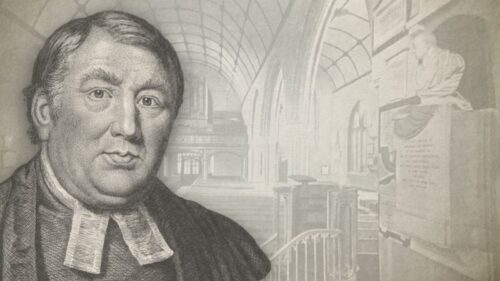
April 3—Morning Devotion
“A man of sorrows, and acquainted with grief.”—Isaiah 53:3
My soul, there is one feature in thy Redeemer’s character, which, in the unequalled abasement of his person, demands thy constant contemplation. I fear it hath not been considered by thee as it ought. And yet it is so sweetly accommodating and lovely, that the more thou beholdest thy Jesus in this tender light, the more endeared he must appear to thee. The prophet, under the Holy Ghost, hath here in a few words sketched the outlines of it – “A man of sorrows, and acquainted with grief?” It was most essential that Jesus should be all this, because it belonged to the curse which he became for his people, when he offered himself as their surety. You will remember, my soul, the curse which God pronounced upon the earth, and man’s passage through it, when he broke the divine law. The ground was cursed; the product of it was to be thorns and thistles; in sorrow, and in the sweat of the brow, was man to eat bread; and, at length, death was to close the life. Now it behoved him who undertook to remove the curse, to bear that curse before the removal of it; and, as such, it behoved Jesus to be “a man of sorrows and acquainted with grief. “Hence all these seized on the Lord Jesus in the first moment he assumed our nature. And though he had no sin in his nature; not being born in the ordinary way of our nature, yet, as a Surety, he was at once exposed to all the frailties in the sinless sorrows, and travails, and labours of it. This sentence would not have been fulfilled, had not Jesus eat bread in the sweat of his brow. So interesting a part, therefore, was it in Christ’s life, that he should labour in a common occupation, that this part of the curse might not go by, without being accomplished. And how eminently, my soul, was this part indeed fulfilled, when, in the garden, the sweat of his brow was drops of blood! How full of thorns and thistles was the earth to Jesus, may be in some measure considered, when we behold him in the unequalled sorrows of the opposition he met with from the world, the unkindness of friends, the malice of enemies. The thorny crown put upon his sacred head was little considered by those that put it; but yet it was, in reality, crowning him Lord of sorrow and grief, beyond all men that ever were exercised with affliction. So great, indeed, was the continued load he bore of grief, and so much did it tend to waste and wear the spirits, that according to that expression of the Jews to him – “thou art not yet fifty years old,” evidently proved, that he had the visage of one of fifty, when only thirty. And it is remarkable, though we are told that Jesus rejoiced in spirit, yet we never read that he was once seen to laugh during his whole life. Precious Jesus, enable me ever to be looking unto thee, thou meek and lowly Lamb of God! And may I never lose sight of this sweet part of thy character also; that whilst thou didst bear our sins, so didst thou carry our sorrows; and in fulfilling the law, didst take away the curse also, when in sorrow thou didst eat bread all the days of thy life.
Robert Hawker (1753-1827) was an Anglican (High-Calvinist) preacher who served as Vicar of Charles Church, Plymouth. John Hazelton wrote of him:
“The prominent features…in Robert Hawker's testimony…was the Person of Christ….Dr. Hawker delighted to speak of his Lord as "My most glorious Christ.” What anxious heart but finds at times in the perusal of the doctor's writings a measure of relief, a softening, and a mellowing? an almost imperceptible yet secret and constraining power in leading out of self and off from the misery and bondage of the flesh into a contemplation of the Person and preciousness of Christ as "the chiefest among ten thousand and the altogether lovely." Christ and Him crucified was emphatically the burden of his song and the keynote of his ministry. He preached his last sermon in Charles Church on March 18th, 1827, and on April 6th he died, after being six years curate and forty-three years vicar of the parish. On the last day of his life he repeated a part of Ephesians 1, from the 6th to the 12th verses, and as he proceeded he enlarged on the verses, but dwelt more fully on these words: "To the praise of His glory Who first trusted in Christ." He paused and asked, "Who first trusted in Christ?" And then made this answer: "It was God the Father Who first trusted in Christ."
Robert Hawker on the Biblical Covenants (Complete)
Robert Hawker's Poor Man's Morning Portions





